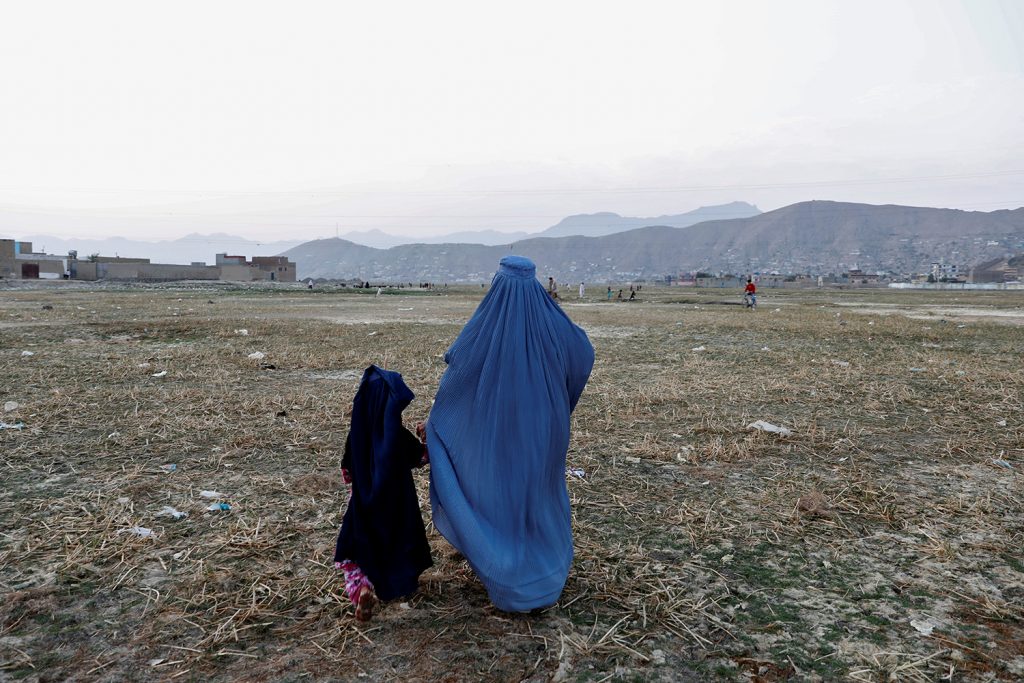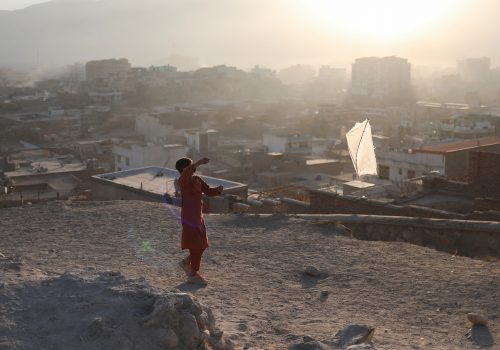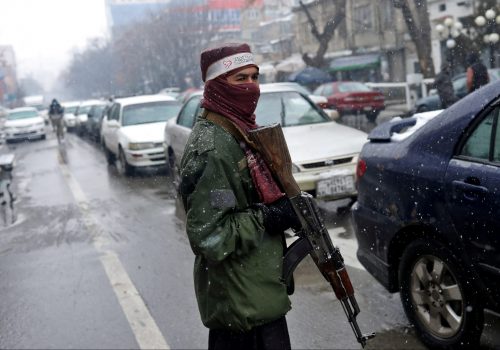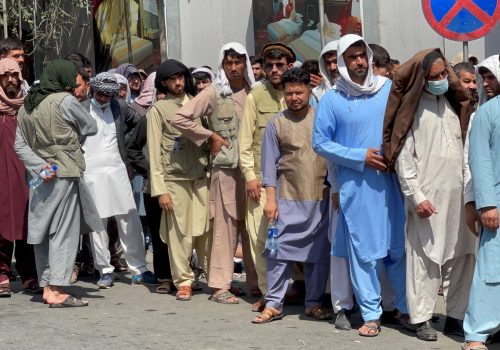During the two decades of US involvement in Afghanistan, women and girls there enjoyed unprecedented opportunities. But the door to those opportunities closed violently with the Taliban takeover and US withdrawal last August. Now, Taliban fighters patrol the streets where girls once walked to school, and women are again denied jobs and even beaten if they dare venture outside alone. Despite pledges of “over the horizon” assistance and continuing aid after the withdrawal, the United States severely cut its human-rights funding. In the months since its withdrawal, the United States has abandoned Afghanistan’s women and girls for a second time.
The Women, Peace, and Security (WPS) Act of 2017 requires Washington to promote the role of women and girls in peace, security, and conflict prevention. No global crisis raises these issues more poignantly than the one in Afghanistan. Despite US President Joe Biden repeatedly reiterating support for gender equality and the WPS agenda, his administration lacks a plan to implement it and its actions undermine the progress of twenty years of US investment in Afghan women and girls.
US withdrawal and absence from Afghanistan requires new and painful adjustments, including even strategically cooperating with the power most likely to fill the vacuum left by the US withdrawal: China. Engaging with Beijing may help to avert a further escalating humanitarian crisis and even unnecessary loss of life caused by Taliban rule.
At first glance, these two are unlikely bedfellows. China is notoriously allergic to international human rights promotion, and its foreign policy includes a non-interference pillar that limits it from becoming involved in the internal affairs of other countries. It also maintains diplomatic ties with the Taliban, provides it significant aid, and could even recognize its government. For precisely these reasons and more, China may be the best partner for the United States as it attempts to stabilize an increasingly desperate situation:
First, China has leverage with the Taliban. The five-billion-dollar annual budget of Afghanistan is in shambles without donor funds, and the US Agency for International Development’s recent moves to allow only certain types of humanitarian assistance have exacerbated the problem. Without US aid, Afghan authorities have no income to pay salaries for public workers. Teachers, doctors, and diplomats all received salaries from money that was aid-based. Neither China nor the Taliban are paying these salaries now, throwing the domestic economy into shambles. But China’s willingness to provide some economic support with “no strings attached” ensures it is on the list of foreign powers to whom the Taliban are most likely to listen. And the group is already lending an ear: Its acting minister of foreign affairs met with Chinese State Councilor and Foreign Minister Wang Yi in Doha in October.
Second, China and the United States share interests in Afghanistan. China’s likely goal is a soft landing for Afghanistan under the Taliban—one in which civilians are protected and the Afghan government is moderate, inclusive, and committed to fighting terrorism. These are the same core interests of the United States, which has been willing to pursue more aggressive tactics to achieve these goals than China—most notably by slapping sanctions on the large number of Haqqani Network members in the Taliban government. Yet rather than using sticks such as sanctions, China is more willing to use carrots like aid and recognition; that is precisely the reason why they could make an effective security partner for the United States in relation to Afghanistan.
Third, having China as a partner in Afghanistan is much better than the alternative: yielding the field entirely to China and effectively abandoning the nineteen million Afghan women and girls. These women are police officers and soldiers; are educated in or training for careers in law, medicine, and politics; and form a generation of peacemakers. The United States invested in democracy and progress in Afghanistan, but in yielding the field to China, it leaves the country vulnerable to the influence of an authoritarian power that wouldn’t maintain same investment in women. Rather, China’s key interests are in Afghanistan’s stability, which does not require improving circumstances for women and girls. Afghan women peacemakers have been arguing for years about how important it is for women to maintain their seat in dialogue with Taliban fighters and even predicted that the Taliban would violently return to power if women were left out of Afghanistan’s political and social fabric.
Skeptics may be concerned that China will use Afghanistan to expand its economic influence, particularly through its Belt and Road Initiative. They may also point out that China’s counterterrorism interests differ from those of the international community: To date, China appears willing to work with the Taliban government, especially after the Taliban promised to not allow Uyghur movements to operate on Afghan soil. These risks do exist: China is likely to economically exploit Afghanistan, and it continues to take a brutal approach to Xinjiang separatists, failing to distinguish between those using peaceful versus violent means.
Yet the United States has a moral obligation not to abandon Afghans completely and to ensure the safety of women and girls, even if the price may include working with adversaries in Beijing. Here’s how the two countries might cooperate to give Afghan women a better future:
New humanitarian corridors: The United States should create these corridors with China as a partner to funnel relief supplies to Afghanistan and assist women who, having missed evacuation flights from Kabul, still need to flee. In December 2021, the UN Security Council authorized broad sanctions exceptions for humanitarian aid, as risk of a health, food, and political crisis continue to grow. But women and girls are often the last to get humanitarian aid. Shared humanitarian efforts by China and the United States can help to ensure more equitable distribution of humanitarian assistance and even stave off the worst risks of starvation and increased refugee flows.
Continued high-level engagement with Afghan women leaders: The United States and China should host dialogues with Afghan women at the highest levels—with added emphasis on the United States’ role because it is the global power most keenly invested in spreading democratic values that uplift women and girls. Beyond the fact that the WPS Act of 2017 requires it, continuing that dialogue would keep the voices of Afghan women at the center of US policy on Afghanistan—which is key for US aid and support to be effective. Only by knowing what Afghan women truly want and need can the United States successfully engage China on the implementation of these goals. China also has incentives to improve its global reputation as a supporter of women as recent #MeToo scandals created renewed pressure on its hosting of the Winter Olympics.
Economic development: The United States and China can collaborate on improving the Afghan economy, with a logical first step being the education and empowerment of Afghan women. Encouraging women’s participation in the workforce is smart economics, according to UN Women, for the benefits they bring to the economy. Excluding fifty percent of the population from a nation’s economic engine has a dampening effect on a country’s economic strength. Supporting women’s participation in the labor force at all levels—from seamstresses to journalists and entrepreneurs—strengthens the economy. China’s own path to economic modernization, which included harnessing the power of women in the labor force, can serve as a model to the Taliban of how much economic progress can be made in a short time when women are included. In the United States and China, examples of what women can contribute to the economy can show the Taliban, which already complains about “brain drain,” that through full economic participation, rather than limiting them or even violently threatening and harming them, women can reverse Afghanistan’s unique form of “brain drain” and open up economic and educational opportunities for all citizens.
Regional integration: US efforts to bring women to political and decision-making tables would be more successful if the United States had regional influence. China has already announced its desire to play a leading role encouraging Afghanistan’s greater integration with its neighbors. Washington is naïve to think that its “over the horizon” diplomacy—engaging with Afghanistan’s Western former donors—is sufficient or a substitute for similar regional effort and integration. It would be smarter for Washington to find a seat at the table next to China among Afghan neighbors to advocate for the inclusion and empowerment of women and girls rather than to stay outside the process. The “Six plus Two” group could be a more influential model for US efforts given current political realities. Whether Washington’s ascendant China hawks like it or not, the most likely foreigners to influence the Taliban are Afghanistan’s neighbors, most notably China.
Counterterrorism cooperation: The US withdrawal and closure of its embassy vastly limits the country’s ability to track terrorist and other nefarious activity, such as the proliferation of drugs or cybercrime, emanating from Afghanistan. China will have these resources and, where US and Chinese interests overlap, it makes sense to work together to combat ISIS-K and other international terrorist movements. The international community has already recognized the importance of the WPS agenda in effectively countering terrorism.
These recommendations would not only elevate the voices of Afghan women and girls but also create better security outcomes for all Afghan people (which, ultimately, is the point of the WPS agenda). It’s time for the Biden administration to look beyond its competition with China and realize that sometimes cooperation makes sense, even with one’s adversaries. The people of Afghanistan, especially its women and girls, deserve no less.
Sahana Dharmapuri is the director of Our Secure Future: Women Make the Difference based in Washington, DC. She is a globally recognized expert on gender and security issues. Her work has appeared at the Atlantic Council, the Harvard Kennedy School of Government, the McCain Institute, Foreign Policy, and other venues.
Eric Richardson is the author of Getting More Back in Diplomacy and is a retired US diplomat who served in Beijing and at the UN Human Rights Council. He is founder of the Geneva-based nongovernmental organization INHR and teaches international law at the University of Michigan and University of California, Berkeley law schools.
Further reading
Mon, Dec 13, 2021
Afghanistan is about to collapse. Here’s what the US must do about it.
New Atlanticist By
Eleven former US ambassadors and commanders issue an urgent warning to Washington and its allies.
Thu, Jan 20, 2022
Pakistan’s ‘Praetorian’ state is a troubling model for a Taliban-led Afghanistan
New Atlanticist By
If the Taliban emulates Pakistan’s Praetorian model, it will further erode all work done to grow a healthy Afghan civil society and develop civilian institutions.
Tue, Feb 15, 2022
On Afghanistan’s $7B question, Biden gets it right
New Atlanticist By Brian O’Toole
The administration has been playing kabuki to ensure at least some cash makes it to the Afghan people.
Image: An Afghan woman clad in burqa walks in the early morning in Kabul, Afghanistan September 2, 2019. Photo via REUTERS/Mohammad Ismail.



